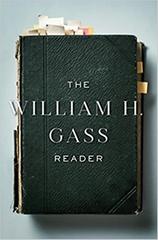 American novelist, short story writer, essayist, literary critic and philosopher William H. Gass died earlier this month at age 93. Gass is credited with coining the term "metafiction," which he frequently used in his work. His three novels, Omensetter's Luck (1966), The Tunnel (1995) and Middle C (2013) all employ the complex, playful, often self-referential prose that made Gass, as described by the New York Times, "one of the most respected authors never to write a bestseller." Omensetter's Luck uses multiple unreliable narrators and stream of consciousness segments to tell the story of a jealous, mentally disturbed priest in an 1890s Ohio town. The Tunnel begins as a history professor's introduction to his completed study of Nazi Germany, and swerves into a merciless, lengthy critique of his own life. Middle C follows an Austrian family who escape the Nazis by pretending to be Jewish, focusing on an amateur pianist son who semi-fraudulently takes a professorship in Ohio.
American novelist, short story writer, essayist, literary critic and philosopher William H. Gass died earlier this month at age 93. Gass is credited with coining the term "metafiction," which he frequently used in his work. His three novels, Omensetter's Luck (1966), The Tunnel (1995) and Middle C (2013) all employ the complex, playful, often self-referential prose that made Gass, as described by the New York Times, "one of the most respected authors never to write a bestseller." Omensetter's Luck uses multiple unreliable narrators and stream of consciousness segments to tell the story of a jealous, mentally disturbed priest in an 1890s Ohio town. The Tunnel begins as a history professor's introduction to his completed study of Nazi Germany, and swerves into a merciless, lengthy critique of his own life. Middle C follows an Austrian family who escape the Nazis by pretending to be Jewish, focusing on an amateur pianist son who semi-fraudulently takes a professorship in Ohio.
Gass's novella and short story collections are In the Heart of the Heart of the Country (1968), Willie Master's Lonesome Wife (1971), and Cartesian Sonata and Other Novellas (1998); his essay collections include Fiction and the Figures of Life (1970), The World Within the Word (1979), Reading Rilke (2000) and On Being Blue: A Philosophical Inquiry (1976). On June 8, 2018, Knopf will publish a 944-page collection of Gass's work titled The William H. Gass Reader ($40, 9781101874745), which samples large swathes of his fiction and nonfiction writing. --Tobias Mutter

